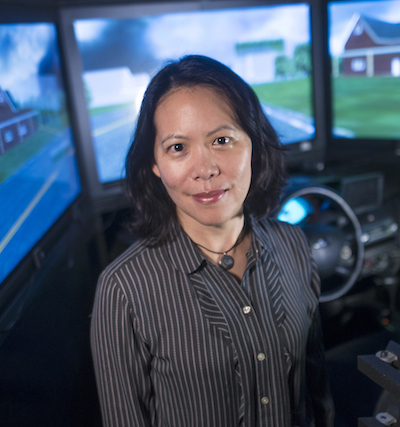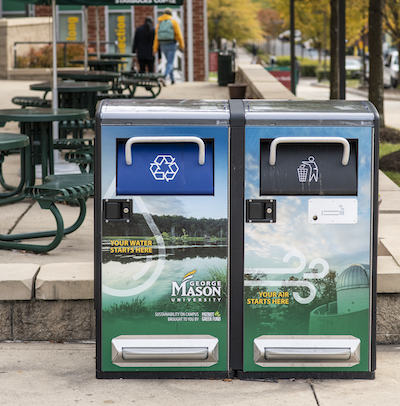From better cell phones to safer cars, the study of human factors—how people interact with technology—improves our lives every day. It’s a rapidly growing field, and while PSYC 340 Human Factors Psychology provides a solid foundation on the subject, George Mason University psychology professor Yi-Ching Lee saw a need for a more advanced course at the undergraduate level, particularly for students considering human factors as a profession.

Lee designed PSYC 461 Advanced Topics in Human Factors, an interactive, hands-on curriculum that challenges students to solve real-life issues, with those students in mind. It was offered for the first time in the spring 2023 semester.
The course started with the study of advanced human factors principles before progressing to a series of projects that gave students the opportunity to apply those principles to human factors projects on campus.
“Knowing the theory is one thing, but using it to make a human interaction more enjoyable is another,” said Lee, who is an associate professor of psychology.
Collaboration with University Libraries and University Sustainability
The timing of the course was just right for students to apply human factors principles to assist Mason’s University Libraries with a website improvement project. After meeting with a library consultant on the goals of the project, students analyzed the requirements and developed recommendations to help improve the user experience. They presented their solutions to University Libraries staff.
The course culminated with a project that examined the Bigbelly smart waste bins located outside of the Starbucks on the northern side of campus. To start, University Sustainability staff briefed students on the “behind-the-scenes" technology of the smart bins, as well as campus guidelines that must be adhered to.
One group of students analyzed the design of the bins and made recommendations to optimize their design, function, and accessibility, with a focus on making the differences between recycle and compost bins more intuitive.
The second group studied the app and website dashboard that alerts the pickup crew when bins are full and made recommendations to optimize design, features, and function. Students presented their ideas to members of Mason’s University Sustainability staff.
Greg Farley, director of University Sustainability, was impressed with the students’ work. “The students brought forward some very good ideas and strong recommendations for improvement,” he said.
Getting the hands-on experience employers demand

“Watching the students’ presentation was like watching a consultant firm pitch a solution to a client—it was hard to remember these were undergraduate students,” said Mason psychology professor Keith Renshaw, the former Department of Psychology chair, who also attended the presentations.
Renshaw, who will transition to become Mason’s associate provost for undergraduate education in August, said he is excited that undergraduate students had this experience. “This type of course is precisely what our students need, and future employers are demanding—strong coverage of relevant knowledge, and then hands-on experience in applying that knowledge to real-world problems.”
Throughout the semester, Lee invited guest speakers from the field to the class, providing valuable insight on potential career paths.
Psychology major Thema Green, who took the class as a sophomore, said the guest speakers and the opportunity to build her professional portfolio were highlights of the class. She is already putting skills she learned into practice as a paid intern working on 3D programming and virtual reality development at the University of Massachusetts Amherst this summer.
“I would recommend that everyone interested in psychology or design take this course,” Green said. “Your contribution is greater than you know because, in the world of human factors and applied cognition, diversity is a necessity. Varying backgrounds offer new insights, which often improve project outcomes.”
Lee said she hopes to teach the special topic course again in spring 2024 semester and wants to find similar opportunities for the next group of students.
“One of the reasons why I collaborated with the University Libraries and University Sustainability was that I wanted students to do something that would benefit the entire university community,” she said. “The implications of this class go beyond this semester. They are making the university better for the next generation of students.”
